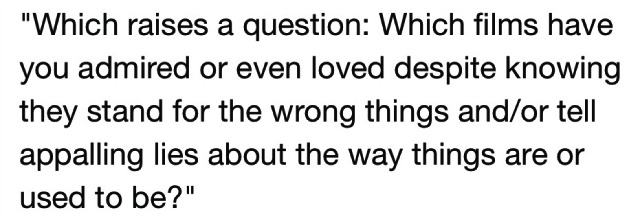It takes a certain amount of character and maturity to simultaneously walk and chew gum about a certain film — to be able to disagree with the content (or some aspect of it) but at the same time admire the chops or the expertise with which it casts a certain emotional spell.
If wokesters disagree with what a film is saying, they’ll write it off without a second thought. Serious cineastes take a broader view. They may not respect or even despise where a film is coming from but the reputable ones can’t reject it entirely if it hits the emotional mark, or if it’s superbly made.
The oldest example is Leni Reifenstahl‘s Triumph of the Will — reprehensible content, mesmerizing technique.
A recent example is Peter Farrelly‘s Green Book, which a chorus of cranky Shallow Hals derided for daring to operate within the realm of 1962 and thereby not in synch with 21st Century wokester values. I knew all that, but there was no denying that Farrelly’s film was emotionally affecting — that the connection between Viggo Mortensen and Mahershala Ali‘s characters carried a kindly, comforting current.
Jean Luc Godard was probably the first serious film demon to acknowledge this dichotomy, In a Cahiers du Cinema piece Godard admitted to being seized with affection for John Wayne‘s Ethan Edwards at the end of The Searchers when he picks up Natalie Wood and says, “Let’s go home, Debbie.” This is a “dishonest” moment from a 20th Century perspective as Ethan is a racist sonuvabitch, and there’s no way he’s going to renounce his gut feelings at the very last minute. But for Godard, the moment was transcendent.
I revisited this idea yesterday when I re-posted a Gunga Din riff from 12.24.17: “Otis Ferguson‘s review of this 1939 adventure flick called it a racist and arrogant celebration of British colonial rule. And yet I’ve been emotionally touched and roused by this film all my life. The last half-hour of Gunga Din is perfect, but it ends with Sam Jaffe‘s Indian ‘bhisti’ basking in post-mortem nirvana over having been accepted as a British soldier.” An appalling idea when you think about it, but it works.
I’ve always hated the shallow fantasy notion of superheroes and the corporate, FX-dependent theology of Marvel and D.C. films, but from time to time I’ve been surprised to find myself buying into the bullshit, Avengers: Endgame being the most recent example.
A couple of times I’ve mentioned how Billy Wilder‘s The Spirit of St. Louis says the wrong things by (a) ignoring the dark underside of Charles Lindbergh — “a nativist anti-Semite who admired the fascist state and urged the United States to stay out of the war because Nazi victory was certain,” as an HE commenter once put it — and (b) shamelessly embracing the idea of heavenly assistance just before the exhausted Lindbergh (James Stewart) is about to land his plane at Le Bourget field in Paris. He starts to lose it — freaking and whimpering over a sudden inability to focus on the basics of landing a plane. Then he thinks back to a “flying prayer” that a priest had passed on, and he blurts out, “Oh, God, help me.” And of course he lands safely. It’s a cheap Sunday-school trick, but Stewart’s acting and Franz Waxman‘s music sells it.










